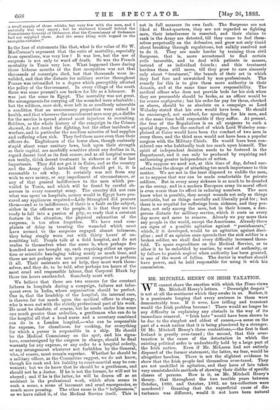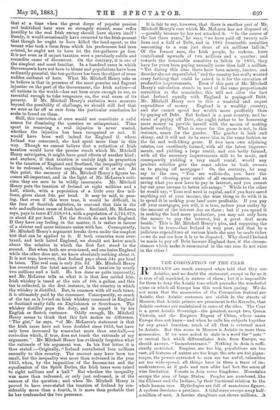MR. MITCHELL HENRY ON IRISH TAXATION.
WE cannot share the emotion with which the Times views Mr. Mitchell Henry's letters. " Downright despair " is not at all the sentiment which they awake in us. Rather, it is a passionate longing that every sentence in them were demonstrably true. If it were, how trifling and transient would the Irish problem become ! There would no longer be any difficulty in explaining any obstacle in the way of its immediate removal. " Irish hate " would have been shown to be due to the simplest and oldest of causes,—a sense on the part of a weak nation that it is being plundered by a stronger. Of Mr. Mitchell Henry's three contentions,—the first is that Ireland is greatly over-taxed ; the second, that this overtaxation is the cause of the detestation in which the existing political order is undoubtedly held by a large part of the Irish nation. Even if Mr. McLaren had not entirely disposed of the former statement, the latter, we fear, would be altogether baseless. There is not the slightest evidence to show that the Irish people feel themselves over-taxed. They are not unskilled in agitation, and they have of late taken very unmistakeable methods of showing their dislike of specific classes of persons. How is it, on Mr. Mitchell Henry's theory, that throughout the two terrible years between October, 1880, and October, 1882, no tax-collectors were murdered Granting that the superficial cause of disturbance was different, would it not have been natural that at a time when the great deeps of popular passion and individual hate were so strangely stirred, some reflex hostility to the real Irish enemy should have shown itself ? Surely, it would occasionally have occurred to the Irish peasant that though he ought to have killed the land-agent, or the tenant who took a farm from which his predecessor had been evicted, he ought not to have let the tax-gatherer go free. It is not even as if unjust taxation were a peculiarly subtle and recondite cause of discontent. On the contrary, it is one of the simplest and most familiar. In a hundred cases in which Governments have not been to blame and populations have been ordinarily peaceful, the tax-gatherer has been the object of some sudden outburst of hate. What Mr. Mitchell Henry asks us to believe is that in presence of the most genuine and flagrant injustice on the part of the Government, the Irish nation—of all nations in the world—has not been acute enough to see, or resentful enough to take vengeance on, the real cause of its poverty. If Mr. Mitchell Henry's statistics were accurate beyond the possibility of challenge, we should still feel that we were as far off as ever from the particular conclusion he seeks to found on them.
Still, this conviction of ours would not constitute a valid reason for dismissing the question as unimportant. Time spent in removing a real injustice is never wasted, whether the injustice has been recognised or not. It .would' have been well indeed for England if, where Ireland was concerned, she had spent more time in this way. Though we cannot believe that a reduction of Irish taxation would have the precise result which Mr. Mitchell Henry anticipates, it might have good effects of another kind ; and anyhow, if that taxation is unduly high in proportion to the taxation of England and Scotland, the inequality ought to be redressed, whether anything comes of it or not. At this point, the accuracy of Mr. Mitchell Henry's figures becomes all-important, and in the light of Mr. McLaren's criticism they are seen to be wildly inaccurate. Mr. Mitchell Henry puts the taxation of Ireland at eight millions and a half, which, with a population of a little over five millions, gives about 34s. per head. It may be said, in passing, that even if this were true, it would be difficult, in the face of Scottish statistics, to contend that this is the sole and sufficient cause of Irish hate. Scotland, Mr. McLaren says, pays in taxes £7,318,014, with a population of 3,744,679, or about £2 per head. Yet the Scotch do not hate England. If they have any feeling in the matter, it is rather in favour of a stricter and more intimate union with her. Consequently, Mr. Mitchell Henry's argument breaks down under the simplest test that can be applied to it. If both countries were overtaxed, and both hated England, we should not know much about the relation in which the first fact stood to the second. But when both are over-taxed, and one hates England while the other does not, we know absolutely nothing about it. It is not true, however, that Ireland pays about 34s. per head in taxes. The real sum is only 23s. 6d. Mr. Mitchell Henry has overstated the total amount of Irish taxation by nearly two millions and a half. He has done so quite innocently, and Mr. McLaren tells us what it is that has misled him. Irish whiskey is taxed at the rate of 10s. a gallon, and this tax is collected, in the first instance, in the country in which the whiskey is distilled. But, in common with all such taxes, it is ultimately paid by the consumer. Consequently, so much of the tax as is levied on Irish whiskey consumed in England or Scotland really falls on Englishmen or Scotchmen. The whiskey distiller pays the duty, and is repaid it by his English or Scotch customer. Oddly enough, Mr. Mitchell Henry seems to think that this fact makes no difference. "The gist," he says, "of Mr. McLaren's statement is that
the Irish taxes have not been doubled since 1853, but have only been increased by somewhat more than one-half,—a correction which, if true, does not touch the rationale of my argument." Mr. Mitchell Henry has evidently forgotten what the rationale of his argument was. In his first letter, it is thus stated :—Originally, " Ireland contributed four millions annually to this country. The amount may have been too small, but the inequality was more than redressed in the year 1853, when, by the imposition of the Income-tax and the equalisation of the Spirit Duties, the Irish taxes were raised to eight millions and a half." But whether the inequality was more than redressed, or only just redressed, is of the essence of the question ; and when Mr. Mitchell Henry is proved to have over-stated the taxation of Ireland by considerably more than a fourth, it is more than probable that he has confounded the two processes.
It is fair to say, however, that there is another part of Mr. Mitchell Henry's case which Mr. McLaren has not disposed of, —possibly because he has not attacked it. " In the course of the last three years," he says, " we have paid off twenty mirlions and a half of Debt, and in 1885 terminable annuities amounting to a sum just short of six millions fall-in.' Of the former sum, the Irish people, he reckons, have contributed upwards of two millions and a quarter; and towards the terminable annuities to fall-in in 1885, they have for years been paying annually more than half a million. " Yet during this time there have been misery, famine, and disorder almost unparalleled," and the country has really wanted every farthing that could be raised in it for the execution of productive improvements. Even if this part of Mr. Mitchell Henry's calculation stands in need of the same proportionate correction as the remainder, this will not alter the fact that Ireland equally with England is paying-off Debt. Mr. Mitchell Henry sees in this a wasteful and unjust expenditure of money. England is a wealthy country, and she cannot spend her wealth more profitably than by paying off Debt. But Ireland is a poor country, and instead of paying off Debt, she ought rather to be borrowing more money to provide herself with the means of making herself wealthy. What is sauce for the goose is not, in this instance, sauce for the gander. The gander is lank and skinny, and it will not do to serve him in the same fashion as the fat and well-liking goose. If two men own adjoining estates, one excellently farmed, with all the latest improvements, and yielding a large rental, and one badly farmed, with all the necessary improvements still to be made, and consequently yielding a very small rental, would any prudent solicitor give the same advice to both owners, as to paying off mortgages ? On the contrary, he may say to the one, "You are well-to-do, you have tha means of clearing your estate of all encumbrances, and sa saving what you now have to pay in interest, and you cannot lay out your income to better advantage." While to the other he would say, "Your real need is capital, and if you have saved anything out of your income, the wise thing to do with it is to spend it in making your land more profitable. If you pay off your mortgages, you will, it is true, reduce your outlay by the amount of the interest due on them ; but if you spend it in making the land more productive, you may not only have the money to pay the interest, but a great deal more beside." This is Mr. Mitchell Henry's plea, and supposing the facts to be true—that Ireland is very poor, and that by a judicious expenditure of various kinds she may be made richer —we do not see how it is to be disputed. Why should Ireland be made to pay off Debt because England does, if the circumstances which make it economical in the one case do not exist in the other ?



































 Previous page
Previous page